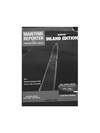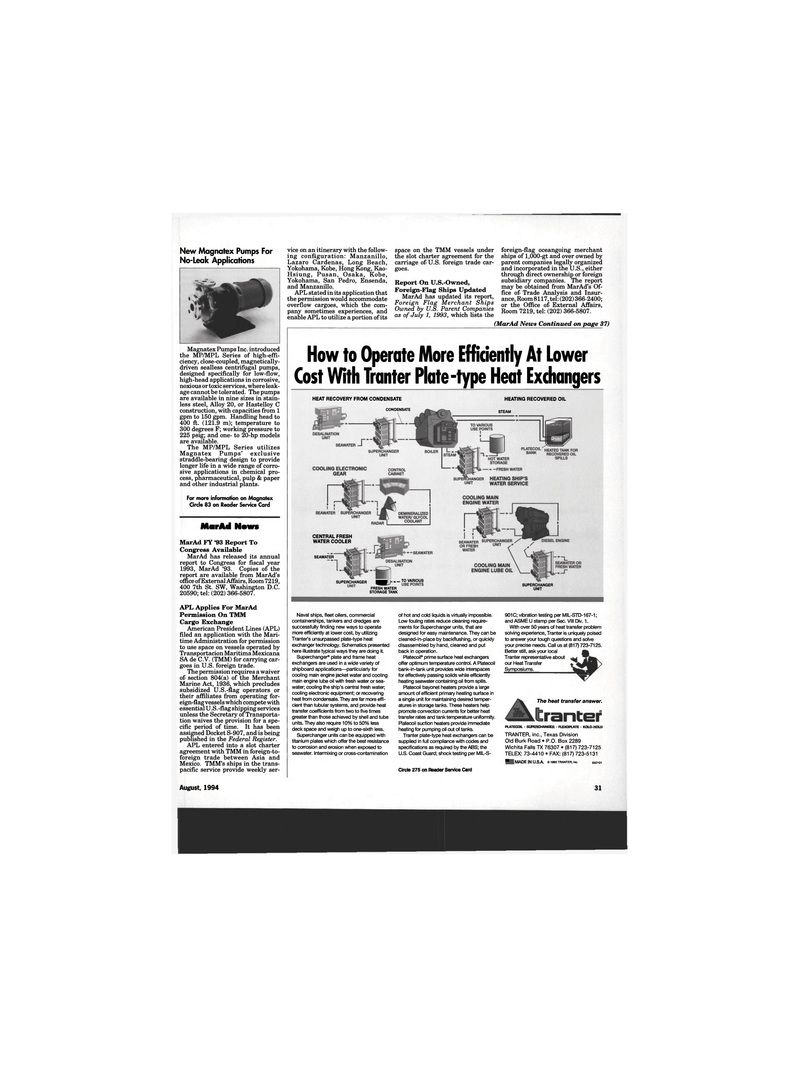
Page 51: of Maritime Reporter Magazine (August 1994)
Read this page in Pdf, Flash or Html5 edition of August 1994 Maritime Reporter Magazine
vice on an itinerary with the follow- ing configuration: Manzanillo,
Lazaro Cardenas, Long Beach,
Yokohama, Kobe, Hong Kong, Kao-
Hsiung, Pusan, Osaka, Kobe,
Yokohama, San Pedro, Ensenda, and Manzanillo.
APL stated in its application that the permission would accommodate overflow cargoes, which the com- pany sometimes experiences, and enable APL to utilize a portion of its space on the TMM vessels under the slot charter agreement for the carriage of U.S. foreign trade car- goes.
Report On U.S.-Owned,
Foreign-Flag Ships Updated
MarAd has updated its report,
Foreign Flag Merchant Ships
Owned by U.S. Parent Companies as of July 1, 1993, which lists the (MarAd News Continued on page 37)
New Magnatex Pumps For
No-Leak Applications
Magnatex Pumps Inc. introduced the MP/MPL Series of high-effi- ciency, close-coupled, magnetically- driven sealless centrifugal pumps, designed specifically for low-flow, high-head applications in corrosive, noxious or toxic services, where leak- age cannot be tolerated. The pumps are available in nine sizes in stain- less steel. Alloy 20, or Hastelloy C construction, with capacities from 1 gpm to 150 gpm. Handling head to 400 ft. (121.9 m); temperature to 300 degrees F; working pressure to 225 psig; and one- to 20-hp models are available.
The MP/MPL Series utilizes
Magnatex Pumps' exclusive straddle-bearing design to provide longer life in a wide range of corro- sive applications in chemical pro- cess, pharmaceutical, pulp & paper and other industrial plants.
For more information on Magnatex
Circle 83 on Reader Service Card
MarAd News
MarAd FY '93 Report To
Congress Available
MarAd has released its annual report to Congress for fiscal year 1993, MarAd '93. Copies of the report are available from MarAd's office of External Affairs, Room 7219, 400 7th St. SW, Washington D.C. 20590; tel: (202) 366-5807.
APL Applies For MarAd
Permission On TMM
Cargo Exchange
American President Lines (APL) filed an application with the Mari- time Administration for permission to use space on vessels operated by
Transportation Maritima Mexicana
SA de C.V. (TMM) for carrying car- goes in U.S. foreign trade.
The permission requires a waiver of section 804(a) of the Merchant
Marine Act, 1936, which precludes subsidized U.S.-flag operators or their affiliates from operating for- eign-flag vessels which compete with essential U.S.-flag shipping services unless the Secretary of Transporta- tion waives the provision for a spe- cific period of time. It has been assigned Docket S-907, and is being published in the Federal Register.
APL entered into a slot charter agreement with TMM in foreign-to- foreign trade between Asia and
Mexico. TMM's ships in the trans- pacific service provide weekly ser-
How to Operate More Efficiently At Lower
Cost With Tranter Plate-type Heat Exchangers
HEAT RECOVERY FROM CONDENSATE
CONDENSATE
HEATING RECOVERED OIL
STEAM
CENTRAL FRESH
WATER COOLER
SEAWATER
SUPERCHANGER ^J-.-TO"
FRESHWATER
STORAGE TANK
SUPERCHANGER
UNIT
Naval ships, fleet oilers, commercial containerships, tankers and dredges are successfully finding new ways to operate more efficiently at lower cost, by utilizing
Tranter's unsurpassed plate-type heat exchanger technology. Schematics presented here illustrate typical ways they are doing it.
Superchanger® plate and frame heat exchangers are used in a wide variety of shipboard applications—particularly for cooling main engine jacket water and cooling main engine lube oil with fresh water or sea- water; cooling the ship's central fresh water; cooling electronic equipment; or recovering heat from condensate. They are far more effi- cient than tubular systems, and provide heat transfer coefficients from two to five times greater than those achieved by shell and tube units. They also require 10% to 50% less deck space and weigh up to one-sixth less.
Superchanger units can be equipped with titanium plates which offer the best resistance to corrosion and erosion when exposed to seawater. Intermixing or cross-contamination of hot and cold liquids is virtually impossible.
Low fouling rates reduce cleaning require- ments for Superchanger units, that are designed for easy maintenance. They can be cleaned-in-place by backflushing, or quickly disassembled by hand, cleaned and put back in operation.
PlatecoiP prime surface heat exchangers offer optimum temperature control. A Platecoil bank-in-tank unit provides wide interspaces for effectively passing solids while efficiently heating seawater containing oil from spills.
Platecoil bayonet heaters provide a large amount of efficient primary heating surface in a single unit for maintaining desired temper- atures in storage tanks. These heaters help promote convection currents for better heat transfer rates and tank temperature uniformity.
Platecoil suction heaters provide immediate heating for pumping oil out of tanks.
Tranter plate-type heat exchangers can be supplied in full compliance with codes and specifications as required by the ABS; the
U.S. Coast Guard; shock testing per MIL-S-
Circle 275 on Reader Service Card 901C; vibration testing per MIL-STD-167-1; and ASME U stamp per Sec. VIII Div. 1.
With over 50 years of heat transfer problem solving experience, Tranter is uniquely poised to answer your tough questions and solve your precise needs. Call us at (817) 723-7125.
Better still, ask your local
Tranter representative about our Heat Transfer
Symposiums. (817) .
The heat transfer answer.
PLATECOIL • SUPERCHANGER • FLEXOPLATE • KOLO-HOLD
TRANTER, inc., Texas Division
Old Burk Road • P.O. Box 2289
Wichita Falls TX 76307 • (817) 723-7125
TELEX: 73-4410 • FAX: (817) 723-5131 • MADEINU.SA © 1993 TRANTER, inc. 550101 foreign-flag oceangoing merchant ships of 1,000-gt and over owned by parent companies legally organized and incorporated in the U.S., either through direct ownership or foreign subsidiary companies. The report may be obtained from MarAd's Of- fice of Trade Analysis and Insur- ance, Room 8117, tel: (202) 366-2400; or the Office of External Affairs,
Room 7219, tel: (202) 366-5807.
August, 1994 31

 50
50

 52
52
